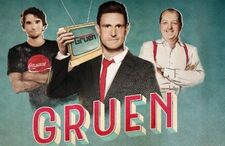'Season 11 of Gruen has just begun on Australian TV. And it completed 100 episodes in 2017.
So what? You may ask. And err, what on earth does Gruen even mean?
Gruen is a show “that tracks advertising almost as closely as advertising tracks you “. Ah, so one of those CNBC Storyboard type programs, you may say. Well, it occupies the prime 8:30pm slot on mainstream network ABC. It consistently features among the top-rated programmes nationally across all channels. It’s been a turbo charger for ABC audience shares. And its panellists are now celebrity brands in their own right.
So what made a specialist programme like Gruen such a phenomenal success with mainstream audiences?
So what? You may ask. And err, what on earth does Gruen even mean?
Gruen is a show “that tracks advertising almost as closely as advertising tracks you “. Ah, so one of those CNBC Storyboard type programs, you may say. Well, it occupies the prime 8:30pm slot on mainstream network ABC. It consistently features among the top-rated programmes nationally across all channels. It’s been a turbo charger for ABC audience shares. And its panellists are now celebrity brands in their own right.
So what made a specialist programme like Gruen such a phenomenal success with mainstream audiences?
First, the focus of examining topical issues and events through an advertising prism. As Wil Anderson, the host, says, “Gruen at its best is less a show about advertising and more a show that uses advertising as a lens to explain the world”
Second, it offers an honest and informative take on advertising - no bulls**t, no pompous pontificating – just a healthy dose of humour. “The Earth spins. We don’t”.
Third, it's a specialist programme but has very strong entertainment codes. Wil Anderson is a well-known comedian while the two permanent panellists, Todd Sampson and Russell Howcroft have carefully cultivated Mac and PC persona. And “The Pitch” segment at the end is an audience favourite, pitting two agencies against each other to ‘sell the unsellable’.
What about “Gruen”? It can be traced back to one architect’s insight about shopping – it’s not about the items you sell, it’s the ‘spectacle’ in which you sell them. The Gruen Transfer is a term related to the psychological effect of shopping malls – they are deliberately designed to appeal to our senses in such a way that from the moment we enter the mall, we lose track of their original intentions and become more susceptible to make impulse buys.
Ironically, Viktor Gruen, after whom it is named, had visualized the shopping mall as a socializing hub and was dismayed at its transformation at the hands of mall developers into “a gigantic shopping machine”.
And yes, in what may be the biggest irony of them all; an ad-free network’s most successful show is on advertising.
First, the focus of examining topical issues and events through an advertising prism. As Wil Anderson, the host, says, “Gruen at its best is less a show about advertising and more a show that uses advertising as a lens to explain the world”
Second, it offers an honest and informative take on advertising - no bulls**t, no pompous pontificating – just a healthy dose of humour. “The Earth spins. We don’t”.
Third, it's a specialist programme but has very strong entertainment codes. Wil Anderson is a well-known comedian while the two permanent panellists, Todd Sampson and Russell Howcroft have carefully cultivated Mac and PC persona. And “The Pitch” segment at the end is an audience favourite, pitting two agencies against each other to ‘sell the unsellable’.
What about “Gruen”? It can be traced back to one architect’s insight about shopping – it’s not about the items you sell, it’s the ‘spectacle’ in which you sell them. The Gruen Transfer is a term related to the psychological effect of shopping malls – they are deliberately designed to appeal to our senses in such a way that from the moment we enter the mall, we lose track of their original intentions and become more susceptible to make impulse buys.
Ironically, Viktor Gruen, after whom it is named, had visualized the shopping mall as a socializing hub and was dismayed at its transformation at the hands of mall developers into “a gigantic shopping machine”.
And yes, in what may be the biggest irony of them all; an ad-free network’s most successful show is on advertising.


